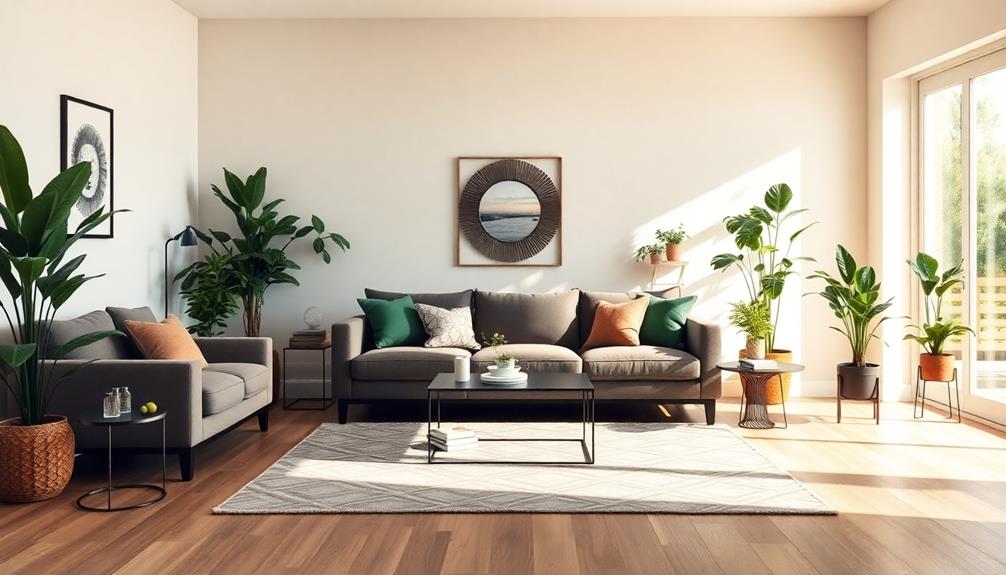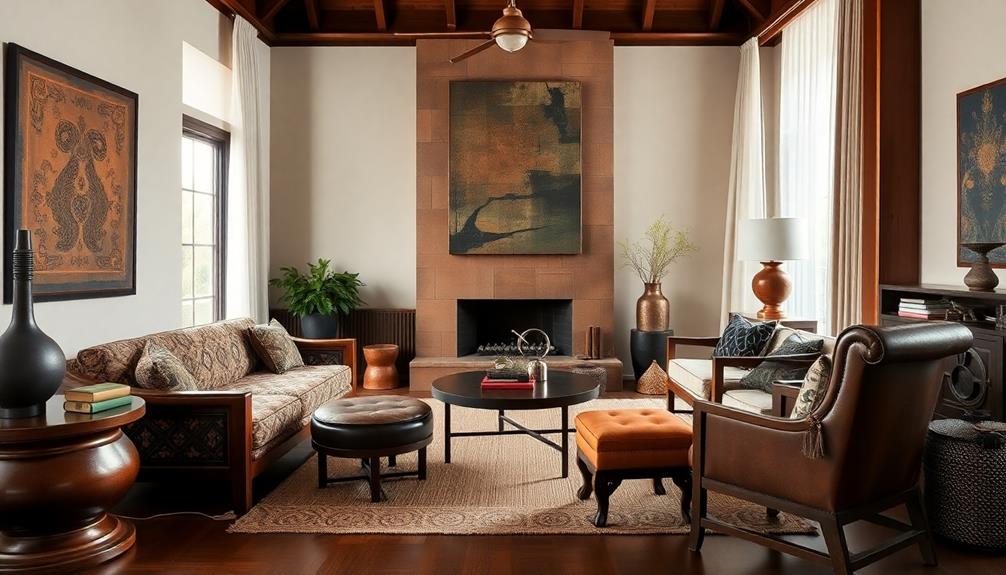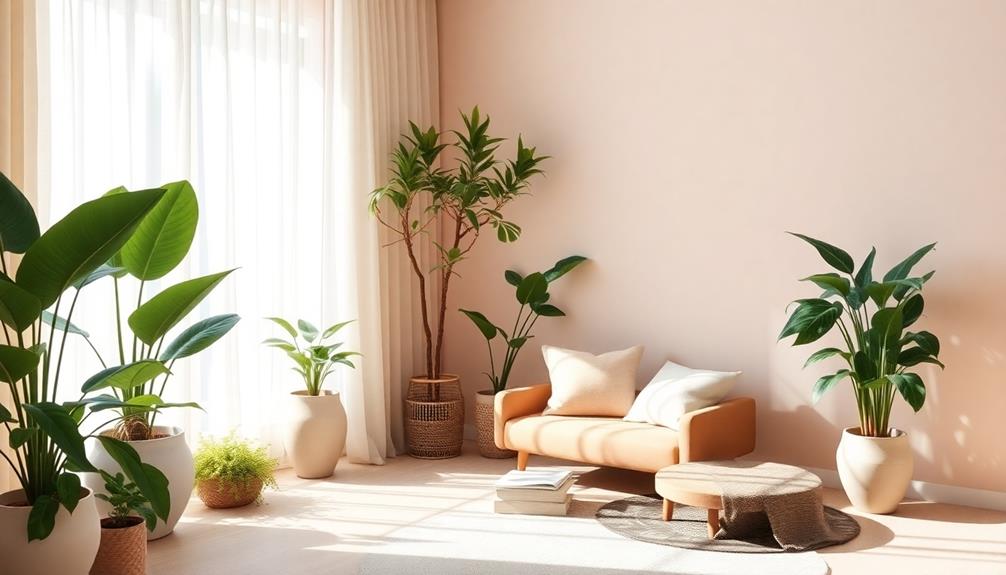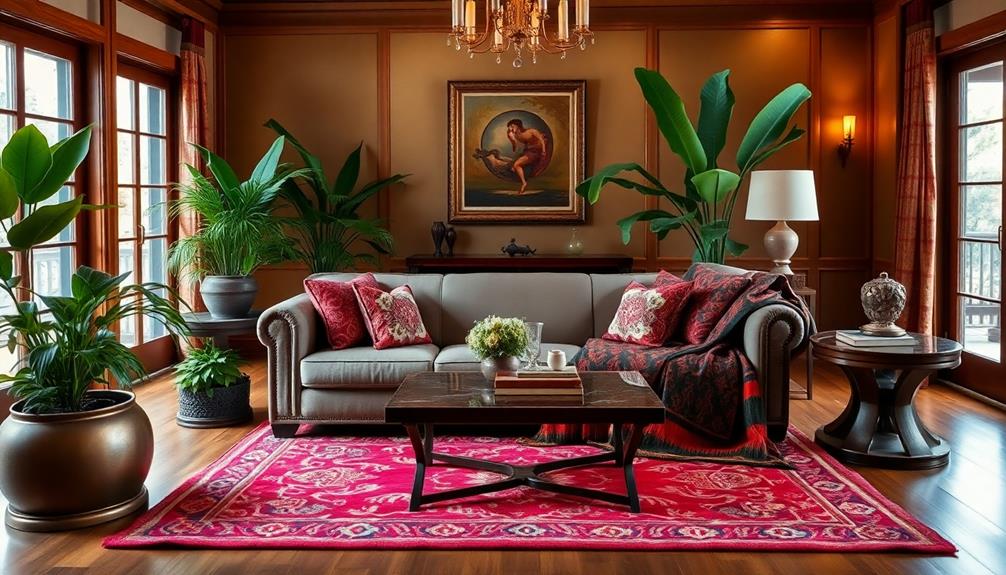Incorporating these five Feng Shui principles can transform your home into a place of tranquility and balance. Start by decluttering to enhance energy flow and reduce stress, making your space feel inviting. Next, arrange your furniture strategically to promote good Chi and create functional zones. Thoughtful mirror placements can amplify light and positivity, while balancing the five elements in your decor fosters harmony and boosts relaxation. With these principles, you'll find your home feels complete and rejuvenating. Stick around to uncover even more ways to enhance your living space!
Key Takeaways
- Embracing Feng Shui principles enhances the flow of Chi, creating a lively and harmonious atmosphere in your home.
- Decluttering promotes positive energy circulation, reducing stress and chaos, leading to a more peaceful living space.
- Strategic furniture arrangement fosters an inviting environment, ensuring comfort and functionality in various areas of your home.
- Thoughtful use of mirrors boosts light and energy flow, reflecting positive elements and enhancing the overall ambiance.
- Balancing the five elements in design promotes relaxation and productivity, creating a sense of completeness and well-being in your home.
Understanding Feng Shui Principles
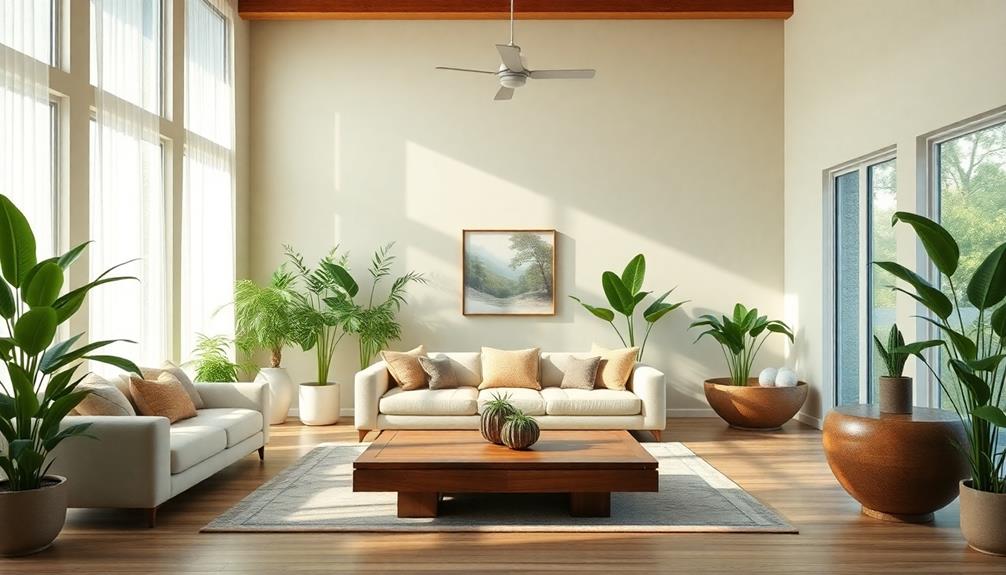
Feng Shui, an ancient Chinese practice, emphasizes the importance of energy flow, or Chi, in your living space. By understanding Feng Shui principles, you can create a balanced and harmonious environment that nurtures your well-being.
Central to this practice is the concept of Chi energy, which flows through your home, influencing your mood and liveliness. To enhance this flow of energy, consider incorporating elements of traditional Indonesian style home decor, which utilizes natural materials and emphasizes harmony with nature.
The Bagua Map serves as an essential tool, dividing your space into nine zones linked to different life aspects like wealth and health. Each zone can be activated by incorporating the five elements: Wood, Fire, Earth, Metal, and Water, ensuring a dynamic and organized space.
Feng Shui design also encourages the use of specific colors and materials to promote positive energy flow. For example, pink may attract love, while green can boost finances.
Additionally, integrating symbols like wind chimes or water features can further enhance the energy in your home.
Importance of Decluttering
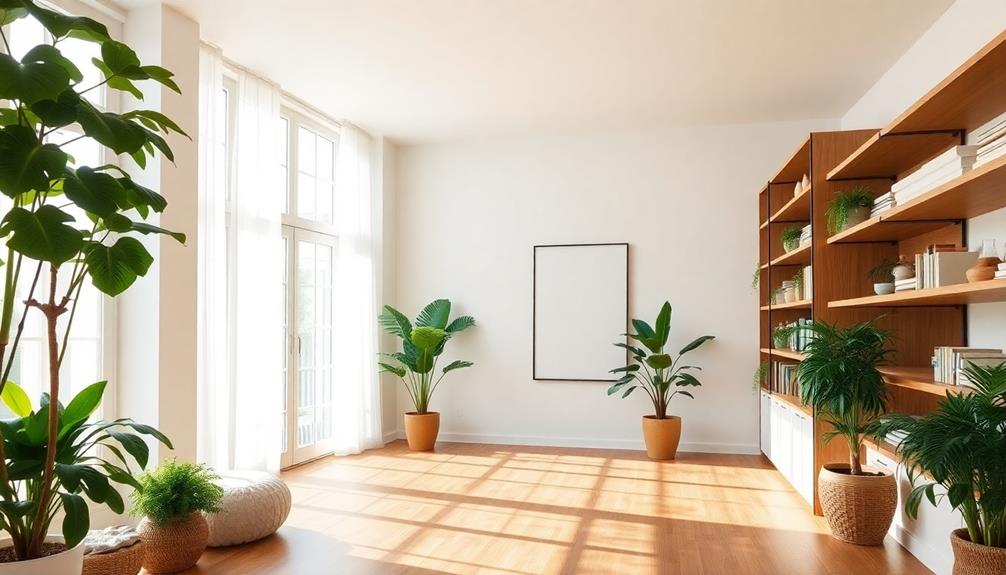
Decluttering is essential for maintaining a harmonious home, as it directly impacts the flow of chi, or energy, throughout your space. In Feng Shui, a clutter-free environment allows positive energy to circulate freely, enhancing your overall well-being. When you regularly declutter, you reduce chaos and stress, fostering mental clarity and emotional stability.
Here's how decluttering can transform your living space:
| Benefits of Decluttering | Effects on Well-being | Tips for Decluttering |
|---|---|---|
| Promotes positive energy | Reduces anxiety | Start small, focus on one area |
| Enhances relaxation | Improves sleep quality | Donate unused items regularly |
| Encourages creativity | Boosts mental clarity | Organize spaces effectively |
| Opens space for opportunities | Fosters emotional balance | Visualize your ideal space |
Strategic Furniture Arrangement
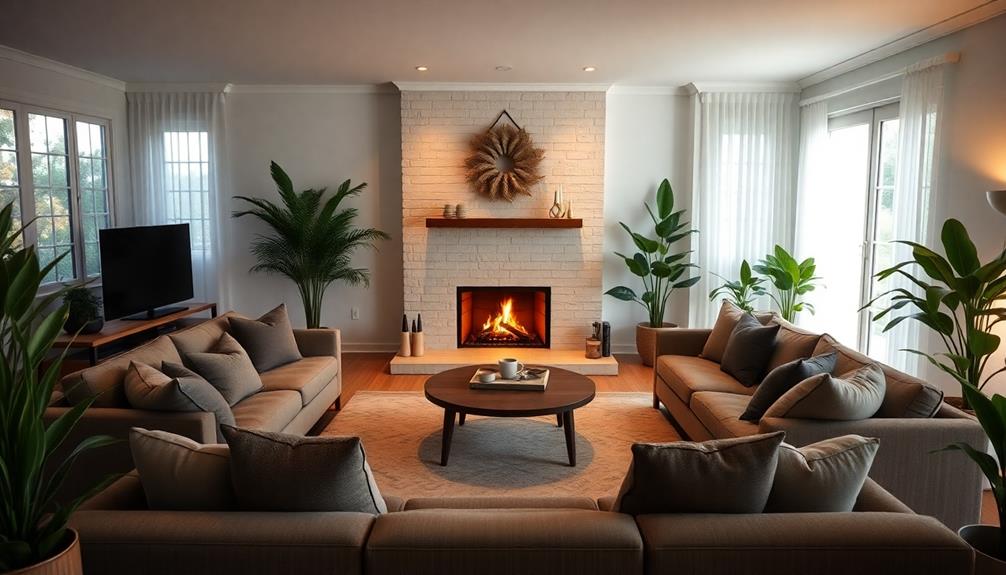
Arranging your furniture strategically can greatly enhance the flow of chi in your home, creating a more inviting and harmonious atmosphere. By positioning key pieces, like sofas and desks, to allow for clear visibility of entryways, you reduce feelings of vulnerability and boost comfort.
One essential element is placing your bed in a command position; ideally, it should face the door without being directly aligned with it. This arrangement promotes security and relaxation, crucial for restful sleep. Incorporating natural materials and earth tones, much like in Balinese interior design concepts, can further enhance the calming effect of your space.
Avoid sharp corners pointed toward seating areas, as they can foster discomfort and anxiety, disrupting your harmonious living space. Instead, utilize furniture to create distinct functional zones within a room. This encourages energy flow and supports various activities, enhancing the overall utility and vibe of your space.
Regularly reassessing your furniture placement can help maintain a balanced environment, allowing you to make adjustments that reflect your changing needs and preferences.
Thoughtful Use of Mirrors
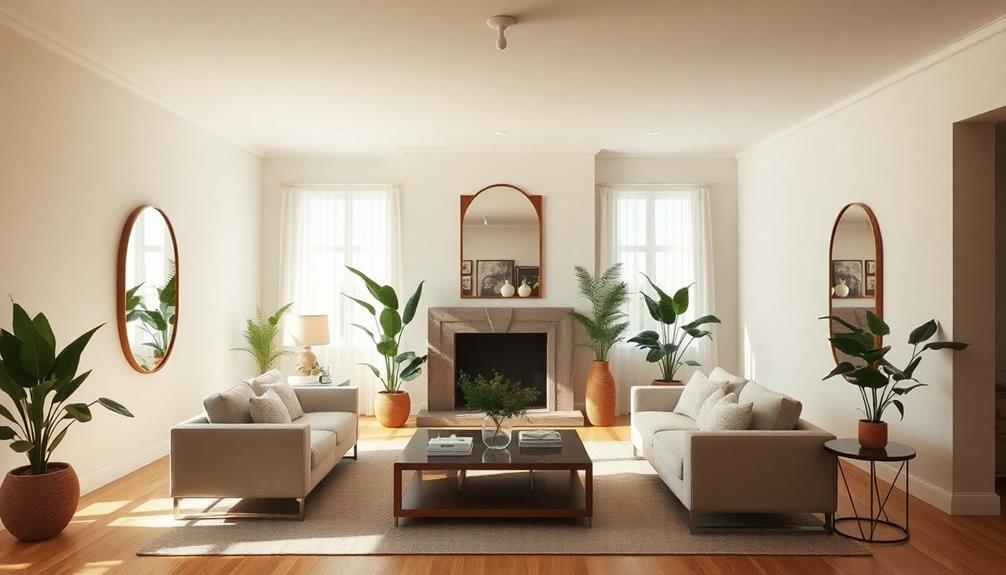
Mirrors can be powerful tools in your home when used thoughtfully, enhancing both light and energy flow. In Feng Shui, the strategic placement of mirrors can greatly impact your living space.
For instance, incorporating elements like traditional artistry through vibrant Indonesian decor masks can complement the energy reflected by mirrors. Position them to reflect positive elements like plants or artwork, which amplifies good energy and promotes a sense of spaciousness.
Avoid placing mirrors directly facing beds or front doors, as this can lead to restlessness and energetic chaos. To maintain a peaceful environment, consider covering mirrors at night. This simple action helps mitigate any negative effects on your sleep, allowing for a more restful night.
Large mirrors can create the illusion of more space, but be cautious not to reflect clutter or negative imagery, as this can disrupt harmony in your home. Regularly evaluate your mirror placements to verify they support the desired energy flow and atmosphere in each room.
An organized approach to mirrors not only reflects your style but also contributes to a serene atmosphere, fostering positive energy throughout your home. Thoughtful use of mirrors can transform your space, making it feel complete and inviting.
Balancing Elements in Design
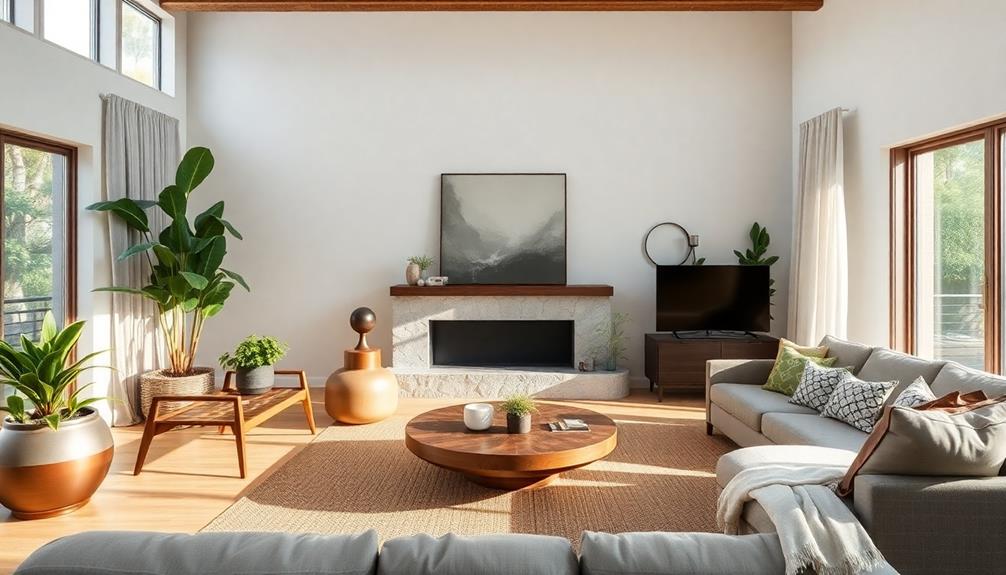
How can you create a harmonious environment in your home? Balancing the five elements—wood, fire, earth, metal, and water—is crucial for enhancing energy flow and promoting relaxation. Each element influences mood and energy, so incorporating them thoughtfully in your home design can greatly improve the quality of your space.
For example, vibrant colors and intricate patterns found in Indonesian decorative pillows can enhance the wood element, evoking feelings of growth and liveliness, while metal accents can provide clarity and structure. Understanding how these elements interact helps you avoid deficiencies; adding water features or blue decor can counteract excessive fire energy, ensuring balance and harmony throughout your home.
Utilizing Feng Shui principles, a chart can guide you in identifying which elements are lacking in your space. This way, you can make informed design choices that foster emotional and physical well-being.
Aiming for a balanced element composition not only enhances your home's aesthetic appeal but also creates a peaceful and calming atmosphere, boosting relaxation and productivity. With these adjustments, you'll cultivate a harmonious environment that resonates with positive energy and tranquility.
Frequently Asked Questions
What Are the 5 Principles of Feng Shui?
The five principles of Feng Shui are Chi Flow, Yin and Yang, the Five Elements, Clutter Clearing, and the Bagua Map. Each principle helps you create a balanced, harmonious, and energetically supportive home environment.
What Are the 5 Elements of Feng Shui?
The five elements of Feng Shui are Wood, Fire, Earth, Metal, and Water. Each element represents unique qualities and energies that influence your space and well-being, guiding you to create a harmonious environment.
How to Use Feng Shui in Your Home?
Transforming your home into a sanctuary could feel like magic! You can use feng shui by decluttering, arranging furniture wisely, adding natural elements, choosing soft colors, and enhancing lighting to create a harmonious, inviting space. Incorporating a feng shui color palette can further elevate the energy in your home, promoting balance and positivity. Opt for soothing hues like gentle greens, calming blues, or warm earth tones to foster a sense of peace and well-being. These thoughtful design choices not only enhance the visual appeal of your space but also nurture your emotional and spiritual connection to your environment.
How Important Is Feng Shui in a House?
Feng Shui's essential for your house because it optimizes energy flow, creating a balanced environment. When you embrace its principles, you enhance your well-being, promote relaxation, and foster a sense of harmony in your space.
Conclusion
By applying these five feng shui principles, you can create a harmonious space that feels complete and inviting. Decluttering not only clears physical space but also promotes mental clarity. When you arrange furniture thoughtfully and use mirrors strategically, you enhance energy flow. Balancing the five elements in your design fosters a sense of equilibrium. While some may debate the scientific basis of feng shui, many find that its practices enhance well-being, proving that intention can shape our environments profoundly.
